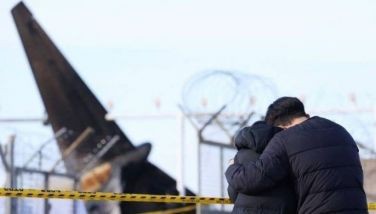Colombians flee homes in Venezuela amid border crackdown
SAN ANTONIO DEL TACHIRA, Venezuela — More than 100 Colombians began fleeing their homes in Venezuela on Tuesday, wading knee-deep through a river separating the two countries, as President Nicolas Maduro vowed to extend a crackdown on illegal migrants living along the border.
The Colombians, many of whom have lived in Venezuela for years, said they were abandoning their cinder block homes in a riverside shantytown community known as "La Invasion" — the Invasion — fearing for their safety after they said they were given 72 hours to pack up and leave by Venezuelan security forces.
With makeshift pedestrian bridges between the two countries destroyed as part of a weeklong security offensive, police from Colombia helped migrants, including children and the elderly, ford the 10-meter wide Tachira River with mattresses, TVs and kitchen appliances slung across their backs and shoulders. Left behind were homes spray-painted in blue by security forces with the letter "R," for reviewed, while those marked with a "D'' are believed to be slated for demolition.
"People are carrying everything they can," Virgelida Serrano, a 60-year-old seamstress who has lived in Venezuela for more than a decade, said between tears. "We're going to Colombia to see what help the government gives us."
The dramatic scene comes as tensions between the South American countries spike to their highest level in years after Maduro closed a major border crossing last week and declared a state of emergency in six western cities. The socialist leader said he was acting to defend residents along the border after gunmen he claimed were paramilitaries linked to former Colombian President Alvaro Uribe shot and wounded three army officers on an anti-smuggling patrol.
In a press conference on Monday, Maduro said the normally busy Simon Bolivar international bridge would remain closed, and restrictions possibly extended to other transit crossings, until Colombian authorities do their part to bring order to the porous, 1,400-mile (2,200 kilometer) border, an area long plagued by violence and drug-trafficking.
"Venezuela won't tolerate this anymore," said a visibly angry Maduro, who dedicated a large share of the two-hour press conference to upbraiding former Colombian President Uribe, calling him a "nefarious paramilitary boss" and "assassin."
Uribe has repeatedly denied links to paramilitaries or killings in Venezuela, saying such allegations are attempts by Maduro, who he calls a dictator, to distract attention from that country's deepening economic crisis as key legislative elections loom in December.
The number deported in recent days is now more than half the 1,772 people expelled last year from Venezuela, according to Colombian statistics, and has overwhelmed a government-built shelter in the border city of Cucuta designed to provide assistance to returning nationals.
An estimated 5 million Colombians live in Venezuela, many of them displaced years ago by Colombia's half-century civil conflict. Although their homeland is much safer now — with Maduro's support, Colombia's government is negotiating a peace deal with leftist rebels— deep roots and the higher cost of living in Colombia has dissuaded many among the poor from returning despite mounting economic woes such as widespread shortages and triple-digit inflation.
President Juan Manuel Santos on Tuesday delivered his strongest rebuke yet of Maduro's actions since the crisis began.
"Raiding homes, removing people by force, separating families, not letting them remove the few goods they own and marking their homes for demolition are totally unacceptable practices," Santos said ahead of an emergency meeting Wednesday between the two nations' foreign ministers. "They recall the bitterest episodes in history that can't be repeated."
Maduro had denied security forces have used excessive force and says that all those expelled are being treated with respect, adding that he is a good friend of Colombians.
He said he was forced to act to protect communities from violent mafias who he says smuggle goods purchased in Venezuela at ultra-low prices and resell them for huge profits across the border, further emptying already barren supermarket shelves. Many of the fleeing Colombians say if Maduro were serious about curtailing contraband, he'd attack corruption within Venezuelan security forces.
As mandated by the constitution, the pro-government National Assembly approved the state of emergency decreed by Maduro during a special session Tuesday held near the border. For the next 60 days, constitutional guarantees such as the right to protest, carry weapons or move freely will be restricted, although officials have gone to great lengths to say they are using the extraordinary powers sparingly.
"I'm sorry if this is creating a humanitarian crisis in Cucuta, but we are only responsible for protecting people who are Venezuelan," National Assembly President Diosdado Cabello said, brushing aside human rights concerns and claims by critics that the closure of the border is a ploy to influence upcoming congressional elections.
"Colombia needs to take care of its own problems," he said.
- Latest
- Trending
































